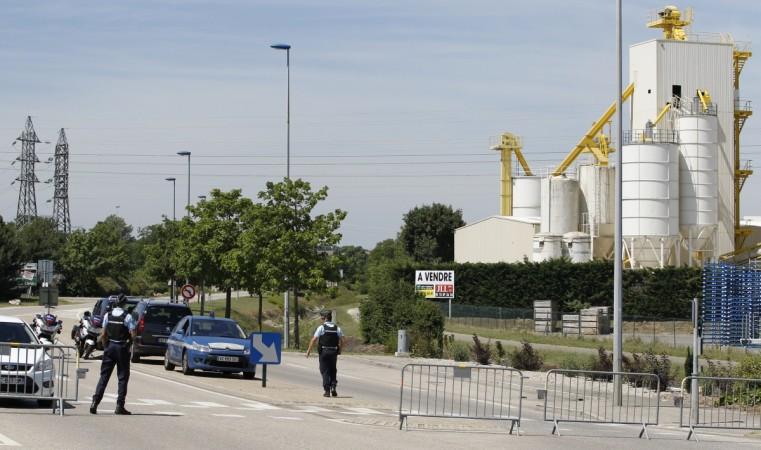
A delivery man with known Islamist connections beheaded his boss and left the body, daubed with Arabic writing, at the site of a U.S.-owned gas factory in southeast France before trying to blow up the complex.
The assailant rammed his delivery van into a warehouse containing gas canisters, triggering an initial explosion, and was arrested minutes later as he tried to open canisters containing flammable chemicals, prosecutors said on Friday.
Police found the head of the victim, the 54-year-old manager of the transport firm that employed the suspect, dangling from a fence.
"The head was discovered hanging on the factory's wire fence, framed by two flags that included references to the shahada, or (Muslim) profession of faith," Paris public prosecutor Francois Molins told a news conference.
France is still coming to terms with attacks by Islamist gunmen who killed 17 people in January at a satirical weekly newspaper and a Jewish food store.
The latest attack occurred on the same day that a gunman killed at least 37 people at a Tunisian beachside hotel and an Islamic State suicide bomber killed two dozen and wounded more than 200 at a mosque in Kuwait.
"There is no other link other than to say that terrorism is our common enemy," said President Francois Hollande, returning to Paris from an EU summit in Brussels.
"There should be no doubt as to our country's ability to protect itself and remain vigilant," he said, announcing a tightening of national security to levels he said were unprecedented in recent decades.
Hollande said there were inscriptions on the headless body, and police sources said they were in Arabic, but officials did not reveal their content.
FATHER OF THREE
No group claimed responsibility for the French attack and the motive was unknown.
The attacker was injured in the blast and arrested on the site. His wife, sister and a third person were taken into custody for questioning.
Interior Minister Bernard Cazeneuve named the suspect as Yassin Sahli. He said Sahli did not have a criminal record but had been under surveillance from 2006 to 2008 on suspicion of having become radicalised by Islamist associates.
The attack occurred at an industrial zone near the town of Saint-Quentin Fallavier to the south of the city of Lyon. Its air, rail and road links have made it one of Europe's major logistics hubs, with through-traffic of 5,000 trucks a day.
Sources close to the investigation said Sahli was a 35-year-old professional driver who lived in the Lyon suburbs. Europe 1 radio interviewed a woman they identified as his wife.
"In the morning he left for work and didn't come home between noon and 2. I was waiting for him," she told Europe 1 radio, saying she and her family of three children lived normal lives as Muslims. "My heart is about to give out."
French television filming outside Sahli's apartment showed pictures of police leading out a woman, her head covered by a blanket, into a waiting car. Forensic police were carrying out searches on the ground-floor apartment.
"They are a very normal family," a neighbour who gave her name as Brigitte said. "I only talked with madame, he didn't say hello or goodbye," the 46-year-old housewife told Reuters.
Police questioned employees for several hours at the transport company run by the victim and seized the suspect's car. A cleaner at a neighbouring business described the victim of the attack as a friendly and polite man, "always saying good morning or good evening and have a nice weekend to his staff".
UNPRECEDENTED THREAT
The attack underlined again the difficulty for authorities across Europe and elsewhere of protecting so-called "soft" targets against strikes by assailants operating by themselves or in small undercover cells.
France, which has contributed aircraft to the international coalition fighting Islamic State insurgents in Iraq, has long been named on Islamist sites as a primary target for attacks.
In January, Islamist gunmen killed 17 people in the offices of the Charlie Hebdo satirical weekly and a Jewish food store.
In April, Prime Minister Manuel Valls said no fewer than five attacks had been thwarted in the country since then.
Noting that hundreds of French nationals are in Syria where they risked being radicalised by Islamist fighters, officials have long said France has never seen a higher threat level.
The site of Friday's attack belonged to Air Products (APD.N), a U.S. industrial gases and chemicals company. It was immediately ringfenced by police and emergency services.
Air Products said its crisis and emergency response teams were "working closely with all relevant authorities" and that it had increased security at its installations around the world.
The company's chairman and chief executive is Seifi Ghasemi, who in 2011 testimony to a U.S. Senate committee described himself as Iranian-born. Mainly Shi'ite Iran is a sworn enemy of Sunni-dominated Islamic State.
According to French regulations applicable to zones where gases and chemicals are handled, the site would have been required to implement security arrangements at the low end of the European Union's so-called "Seveso" scale, named after the location of an industrial accident in northern Italy in 1976.
Prosecutor Molins said closed-circuit TV images showed the attacker arriving at the site. Because his vehicle was authorised to make deliveries, it was allowed through the gates.
The CCTV cameras lost track of his movements for several minutes, then picked up the van again as it accelerated towards a warehouse within the premises. A loud explosion was heard.
When emergency services arrived a few minutes later, they found the headless body of the victim by the van and a knife nearby. They overpowered the suspect as he was opening bottles of acetone, a flammable liquid chemical.
Cazeneuve said the government had ordered security to be stepped up around all sensitive sites and Hollande announced that security arrangements in the region would be placed at their highest level for the next three days.

















